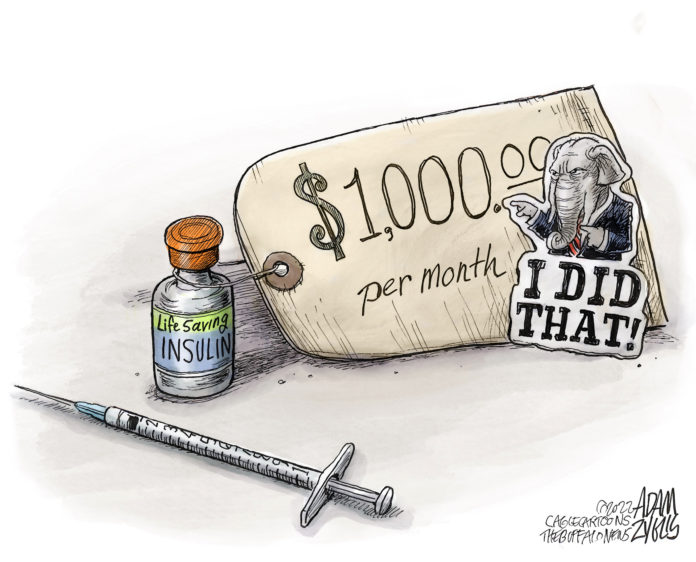If I choose, I can drift down to my corner store, flash an ID – so corporate bosses can collect my personal data – and buy a pack of cigarettes.
Yet, cigarettes – perfectly legal for adults – have been banned from the television and radio airwaves since 1971, exiled from the world of advertising. Too dangerous!
I think of this mornings while watching the network news shows. They seem to depend upon the marketing of miracle drugs for their ad revenue – along with a constant barrage of product placements under the guise of “great deals today.
These drugs – which also introduce us regularly to a new rare disease that needs immediate attention – are not available over the counter. I cannot walk into my corner store and pick some up. Even at the drug store, I would need a prescription. [“Ask your doctor … ”]
Yet, we, in our wisdom, banned the advertising of a legal drug such as nicotine, but allow the constant promotion of deadly controlled substances.
Sure, nicotine is addictive and smoking causes all kinds of health problems. Except for a few symbolic cigars, I have steered clear of it.
But pay attention to Big Pharma’s ads while they visually depict bucolic paradises and heartwarming scenes with family and friends. After the basic intro, the spot becomes a litany of dangerous, debilitating and potentially fatal side effects.
Unless you fall asleep while smoking and burn down the house, the deleterious effects of smoking take years to develop. These wonder drug ads often contain the proviso to “seek immediate treatment” if you have an adverse reaction at first ingestion. And know, too, that these drug pushers are not required to air all of their drugs’ possible side effects.
But you cannot buy these drugs without a prescription?
Well, the opioid epidemic was fueled largely by prescriptions. Later, some drug companies, doctors and pharmacists were charged with prioritizing profits over protecting patients. People have been found guilty and corporations fined [a pittance of their profits].
That seems to be standard operating procedure for corporate medicine makers. Earlier this year America’s Health Insurance Plans issued the finding that, “AbbVie, Pfizer, Novartis, GlaxoSmithKline, Sanofi, Bayer and Johnson & Johnson all spent more on marketing and selling their products in 2020 than they did on developing new treatments.”
These seven companies spent $45 billion more on pushing their drugs than on research and development.
As AHIP points out, “this use of dollars occurred during a year dedicated to the development of new treatments and vaccines to overcome the COVID-19 crisis.”
Speaking of COVID, the People’s Vaccine Alliance reported last week “that Pfizer’s planned [COVID vaccine] price hike would amount to a 10,000% markup above the cost of producing the vaccine,” according to Jake Johnson of Common Dreams.
On the surface, one might suppose that public, pontificating drug warrior politicians would oppose the overt pushing of dangerous drugs on an unsuspecting populace
But if there’s money to be made …
OpenSecrets, which follows the money in politics, reported last July that the drug makers spent “nearly $390 million on lobbying in 2021.” Last year the same group reported Big Pharma had three times as many lobbyists as we have members of Congress.
Maybe there’s a reason why Americans are paying 10 times more for their drugs than people in any other countries and some of our neighbors are risking their lives by rationing their insulin usage because of its high cost.
Think about the next time you see one of those All-American drug ads, and join Oklahoma’s own Hoyt Axton and sing out:
“God damn the pusher man.”








